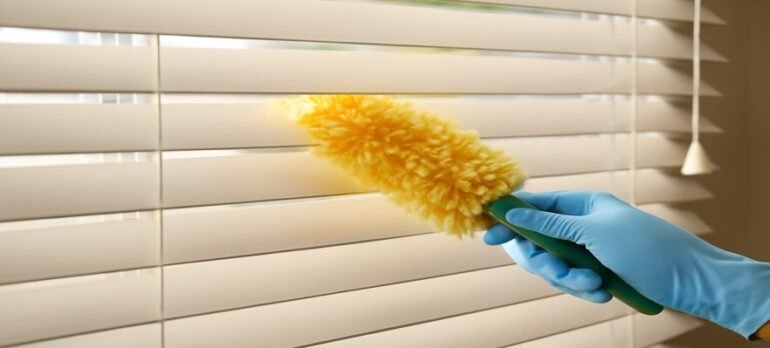
Blinds often collect dust, pollen, and moisture from daily life, especially in coastal areas with changing weather. While they might seem like a small part of your home, blinds can significantly impact your indoor air quality and the overall look of your space. Regular cleaning keeps them looking neat and helps you breathe easier.
Why Blind Cleaning Matters
When blinds are left dusty for too long, they can affect the air quality in your home. This is particularly problematic for people with allergies or asthma. Even if you vacuum the floors and wipe down the furniture, dirty blinds will still spread dust around the room. Clean blinds also contribute to the overall aesthetics of your home. They allow light to filter through your windows better and help your rooms feel well-kept. On the other hand, dirty blinds can make even a tidy space feel neglected.
If your home feels stuffy or your allergies are acting up, it may be time for a deeper clean. For instance, consider pairing blind cleaning with services like window cleaning to help reduce indoor allergens and refresh your entire space.
How to Clean Different Types of Blinds
The best way to clean your blinds depends on their material.
- Venetian blinds: Wipe each slat gently to avoid bending them.
- Roller blinds: A damp cloth and mild soap are ideal for removing dust and grime.
- Vertical blinds: Use a soft vacuum brush to keep them free of dust without damaging them.
- Wooden blinds: Keep them as dry as possible to prevent water damage.
If your blinds are stained or haven’t been cleaned in months, professional blind cleaning may be the safest option. This ensures they’re cleaned thoroughly without risk of damage, especially if you’re unsure about the right products or methods.
How Often Should You Clean Blinds?
It’s recommended to wipe your blinds lightly once a week to prevent dust buildup. For a deeper clean, aim to clean them every three to six months. This helps remove grime and pollen that may collect in corners or behind slats. If you have pets, live near a busy road, or face damp conditions around your windows, you might need to clean your blinds more often. Also, consider checking your gutters regularly to prevent moisture build-up around your windows, which could lead to mould.
Should You DIY or Hire a Pro?
For light cleaning, a soft cloth or duster works fine. However, if your blinds are stained, difficult to reach, or made of delicate materials, hiring a professional is a good idea. A professional cleaning service will not only save you time but will also ensure that your blinds are protected from potential damage. Professionals use specialised tools and techniques to clean your blinds more deeply than you can with household supplies—this is especially helpful when preparing for guests or a move-out inspection.
Tips to Keep Blinds Clean Longer
By developing a few simple habits, you can make your blind cleaning last longer. For example:
- Keep windows closed on windy days to prevent dust from settling on your blinds.
- Dust your blinds gently once a week.
- Avoid touching blinds with greasy or dirty hands.
Also, pairing blind cleaning with window cleaning can help prevent streaks and spots, making your space feel even fresher.
Conclusion
Blinds do more than just block the sun—they also influence the look and feel of your home. Keeping them clean improves your indoor air quality, boosts the appearance of your space, and extends their lifespan. If it’s been a while since your last deep clean, now is the perfect time to schedule one.
For a professional touch, contact Quik Solutions for expert blind cleaning services.


